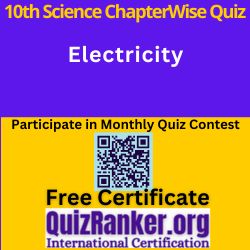10th Science Electricity MCQ Test Chapter 11: Test your knowledge with free online multiple-choice questions for CBSE Class 10 Science Chapter 11. Understand key concepts of electricity, including current, voltage, resistance, and Ohm’s Law. Ideal for CBSE exam preparation and competitive tests.
10th Science Electricity MCQ Test Quiz
Chapters of 10th Science for MCQ Test
You can not only check your knowledge about for “10th Science Electricity MCQ Test Chapter 11” but also all remaining chapters multiple choice questions.
Chapter 1 Chemical Reactions and Equations MCQ Test
Chapter 2 Acids, Bases and Salts MCQ Test
Chapter 3 Metals and Non-metals MCQ Test
Chapter 4 Carbon and its Compounds MCQ Test
Chapter 5 Life Processes MCQ Test
Chapter 6 Control and Coordination MCQ Test
Chapter 7 How do Organisms Reproduce? MCQ Test
Chapter 8 Heredity MCQ Test
Chapter 9 Light – Reflection and Refraction MCQ Test
Chapter 10 The Human Eye and the Colourful World MCQ Test
Chapter 11 Electricity MCQ Test
Chapter 12 Magnetic Effects of Electric Current MCQ Test
Chapter 13 Our Environment MCQ Test
Also Attempt Free 10th class Math chapter wise MCQ Quiz [For Exam 2025]
Must Attempt Monthly Quiz Contest
- Class 9th Science quiz contest monthly
- Class 9th Math quiz contest monthly
- Class 10th Science quiz contest monthly
- Class 10th Math quiz contest monthly
You can also participate in yearly national quiz contest Dec 2024
Important Link
- NCERT Books PDF
- Our Youtube Channel(Subscribe for view Few Quiz Question Answers)
About 10th Science Electricity MCQ Test
Chapter 11 of the CBSE Class 10 Science curriculum, titled “Electricity,” introduces the fundamental concepts of electric current, voltage, resistance, and the laws governing electrical circuits. This chapter is crucial for understanding how electrical systems operate and for solving problems related to electrical circuits. The free MCQ quiz provided in this chapter will help students solidify their understanding and prepare effectively for their CBSE examinations.
Key Concepts Covered:
- Electric Current:
- Definition: Electric current is the flow of electric charge through a conductor. It is measured in amperes (A).
- Direction: Conventional current flows from the positive terminal to the negative terminal of a power source.
- Measurement: Current is measured using an ammeter, which is connected in series with the circuit.
- Voltage (Potential Difference):
- Definition: Voltage is the electrical potential difference between two points in a circuit. It is measured in volts (V).
- Role: Voltage drives the flow of electric current through a circuit.
- Measurement: Voltage is measured using a voltmeter, which is connected in parallel with the component.
- Resistance:
- Definition: Resistance is the opposition to the flow of electric current in a conductor. It is measured in ohms (Ω).
- Factors Affecting Resistance:
- Material: Conductors have low resistance, while insulators have high resistance.
- Length: Longer conductors have higher resistance.
- Cross-Sectional Area: Wider conductors have lower resistance.
- Temperature: Resistance typically increases with temperature for most conductors.
- Ohm’s Law:
- Statement: Ohm’s Law states that the current through a conductor is directly proportional to the voltage across it and inversely proportional to its resistance. It can be expressed as: V = IR, where V is the voltage, I is the current, and R is the resistance.
- Applications: Ohm’s Law is used to calculate unknown values in electrical circuits.
- Electrical Power:
- Definition: Electrical power is the rate at which electrical energy is converted into other forms of energy. It is measured in watts (W).
- Formula: Power (P) can be calculated using the formula: P = VI, where V is the voltage and I is the current.
- Calculation: Power can also be calculated using Ohm’s Law as: P = I²R or P = V²/R.
- Series and Parallel Circuits:
- Series Circuits: In a series circuit, components are connected end-to-end, so the same current flows through all components. The total resistance is the sum of individual resistances (R_total = R₁ + R₂ + …).
- Parallel Circuits: In a parallel circuit, components are connected across the same voltage source, so the voltage across each component is the same. The total resistance is given by 1/R_total = 1/R₁ + 1/R₂ + …).
- Circuit Components:
- Resistors: Devices that provide resistance to control the current flow in a circuit.
- Capacitors: Components that store electrical energy temporarily.
- Batteries: Provide the voltage needed to drive current through a circuit.
- Switches: Devices used to open or close a circuit.
- Electrical Safety:
- Precautions: Ensure proper insulation, avoid overloading circuits, and use appropriate circuit breakers.
- Grounding: Helps in protecting against electrical faults and shocks.
Quiz Structure:
The MCQ quiz for this chapter includes a series of questions designed to test students’ understanding of electric current, voltage, resistance, Ohm’s Law, electrical power, and circuit types. These questions cover definitions, formulas, and practical applications of electricity. The interactive format allows students to practice and assess their knowledge effectively.
Conclusion:
Practicing with the 10th Science Electricity MCQ Test Chapter 11 is an excellent way for CBSE students to prepare for their exams. This chapter provides a detailed understanding of the principles and applications of electricity, which are essential for solving electrical problems and understanding electrical systems. The MCQ quiz helps reinforce these concepts, ensuring students are well-prepared for their academic assessments and competitive exams.
Total Views: 7
